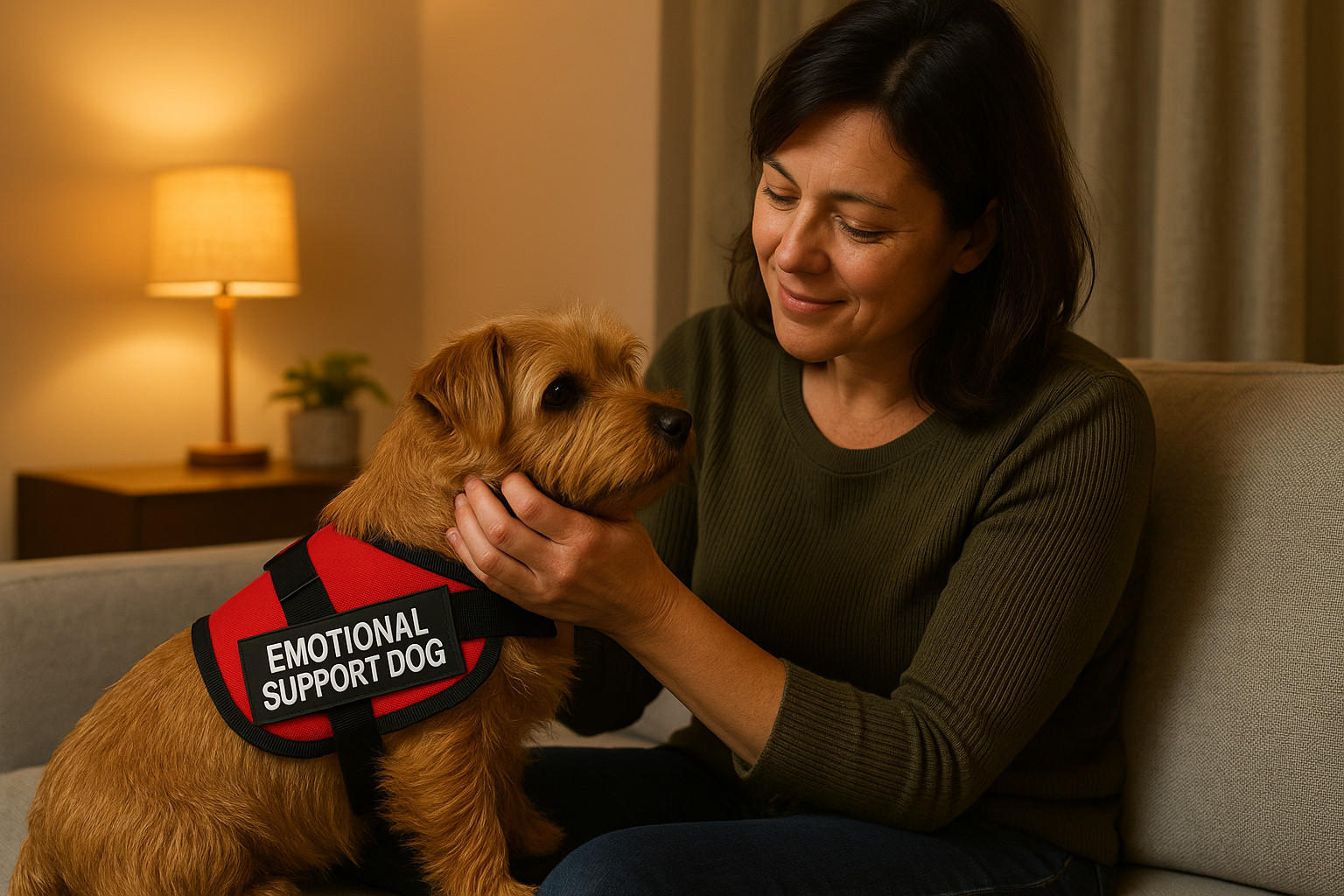Norfolk Terrier as an Emotional Support Dog

Choosing the right companion animal for emotional support is integral to ensuring psychological well-being and comfort. The Norfolk Terrier, with its spirited yet gentle demeanor, offers a unique blend of attributes that makes it well-suited for this role. Here's an in-depth look at why the Norfolk Terrier can be an excellent emotional support dog.
Understanding the Emotional Support Role
Emotional support animals (ESAs) primarily provide companionship and can alleviate symptoms of emotional or mental health conditions. Unlike service or therapy dogs, they aren't required to perform tasks but merely to be present and offer comfort. In this context, the Norfolk Terrier can use its natural instincts to connect deeply with humans.
Norfolk Terrier Overview
The Norfolk Terrier, a small and sturdy breed, originates from England. They are one of the smallest working terriers, typically weighing around 11 to 12 pounds. Despite their diminutive size, Norfolk Terriers are known for their big personalities – they are confident, alert, and have a charming, affectionate nature that endears them to many.
Temperament and Emotional Connection
The Norfolk Terrier’s temperament makes it an ideal candidate as an emotional support dog. Their affectionate nature ensures they form strong bonds with their owners, responding empathetically to human emotions. This breed is known for its sensitivity; it can discern moods and adjust its behavior to offer comfort. Their constant desire for human companionship can help alleviate feelings of loneliness and depression. Their vivacious personality and eagerness to please can lift spirits and provide emotional stability.
Adaptability and Daily Behavior
Adaptability is a hallmark of the Norfolk Terrier. They comfortably adjust to various living situations, whether it's an urban apartment or a rural home, making them versatile companions. Their moderate energy levels mean they are content with leisurely indoor play and moderate walks, conducive to both active and less active lifestyles. Importantly, Norfolk Terriers are known for their loyalty and protective instincts, contributing to a sense of security for their human companions.
Situations Where Norfolk Terrier Provides Strong Support
- Individuals with anxiety benefit from the Norfolk Terrier’s calming presence.
- For those recovering from trauma, this breed offers consistent companionship and an intuitive understanding of emotional needs.
- Older adults, potentially in assisted living arrangements, find comfort in their manageable size and affectionate demeanor.
Ideal Living Environments
The Norfolk Terrier thrives in diverse environments, but there are conditions where their supportive nature shines brightest:
- Apartments: Their small size and moderate energy levels make them suitable for confined spaces, providing companionship without requiring extensive outdoor space.
- Family homes: Patient and tolerable, they can integrate well into families, offering affection to both adults and children.
- Assisted living facilities: Their small stature and gentle nature make them ideal for elderly individuals looking for direct physical and emotional companionship.
Bonds with Different Types of People
Norfolk Terriers are adept at forming meaningful bonds with diverse individuals. Their adaptability ensures they can connect with children, adults, and seniors alike. They offer:
- Playful interactions with children that provide both entertainment and education.
- Gentle and calming companionship for adults dealing with daily stressors.
- Steady, comforting presence for seniors, helping to reduce feelings of isolation.
Health, Care, and Wellbeing
Common Health Considerations
Health plays a crucial role in an emotional support dog's ability to provide comfort. Norfolk Terriers are relatively healthy but prone to specific conditions, such as heart murmurs and hip dysplasia. Regular veterinary check-ups are essential to maintain their health and capacity to offer support. A balanced diet and regular exercise also contribute to their physical and emotional readiness to fulfill their role as an ESA.
Grooming, Comfort, and Maintenance Needs
Even though their grooming needs are not overly demanding, consistent care keeps Norfolk Terriers comfortable and content as an ESA:
- Coat care: Regular brushing prevents matting and controls shedding, which is essential for maintaining cleanliness and comfort, especially if the individual they are supporting is sensitive to allergens.
- Nail trimming and dental care: Routine grooming practices ensure overall well-being, contributing positively to the dog's temperament and health.
Preparing a Norfolk Terrier for Emotional Support Work
A Norfolk Terrier's preparation for emotional support involves targeted socialization and understanding of emotional cues.
Socialization and Responsiveness
Early socialization is key for Norfolk Terriers to interact positively with various people and environments. Exposure to different social settings enhances their ability to adapt and provide consistent support.
Managing Stress and Emotional Cues
Understanding stress management is vital for Norfolk Terriers in an emotional support role. Training them to read and respond to human emotions ensures effective support. Their natural empathy can be nurtured through positive reinforcement, encouraging behaviors that comfort and soothe.
Strengths, Challenges, and Ideal Homes for Norfolk Terrier
The Norfolk Terrier's strengths include their loyalty, adaptability, and responsive nature. They are less prone to behavioral issues given consistent training and socialization.
- Strengths: Adaptability to living environments, strong emotional intelligence, affectionate bond with humans.
- Challenges: Prone to specific health issues, require consistent grooming.
- Ideal homes: Variants of households, from single adults to multi-generation family homes, provided there is enough time for bonding and care.
Final Thoughts
The Norfolk Terrier, with its delightful blend of affection, adaptability, and emotional perceptiveness, stands out as a reliable emotional support dog. They shine in environments where they can form strong bonds and offer their spirited companionship.
Key Takeaways for the Norfolk Terrier as an Emotional Support Dog
- Best suited for: Individuals in apartments, seniors, small families.
- Not ideal for: Extremely busy individuals with little time for interaction.
- Emotional traits: Empathetic, affectionate, responsive to human emotions.
- Care and health notes: Regular grooming, balanced diet, routine veterinary care.
- Environments where they provide the most comfort: Apartments, family settings, assisted living facilities.
In conclusion, the Norfolk Terrier’s unique blend of emotional intelligence and affectionate nature makes it a wonderful choice for those seeking an emotional support dog.











